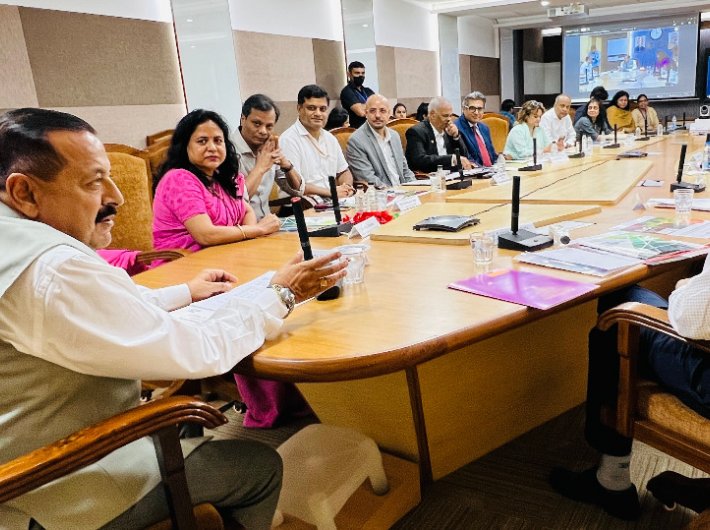‘Bioeconomy Report 2022’ released, Special Biotech Ignition Grant call for North East Region (BIG-NER) launched
Bioeconomy will be key to India’s future economy over the next 25 years, says union minister of state (independent charge) science and technology Dr Jitendra Singh.
Releasing ‘India’s Bioeconomy Report 2022’ here Tuesday, he pointed out that India’s bioeconomy has reached over $80 billion in 2021, recording 14.1% growth over $70.2 billion in 2020. Noting the rapid growth in the sector, the minister said bioeconomy is likely to touch $150 billion by 2025 and over $300 billion by 2030.
The minister urged all the stakeholders of the biotech sector, particularly the industry, startup ecosystem, investors, scientists, scholars, entrepreneurs and enablers like DBT and BIRAC, to collectively work to achieve the ambitious target.
The number of biotech start-ups in the country has increased from 50 to over 5,300 in the last 10 years, because of the growing enabling ecosystem and prioritisation provided by prime minister Narendra Modi, said Dr. Singh who is also minister of state (independent charge) earth sciences; MoS PMO, personnel, public grievances, pensions, atomic energy and space. He hoped that biotech start-ups arising from strong talent pool are expected to further increase two times, to 10,000-plus by 2025.
He recalled that Modi's presence in the first National Biotech Start-up Expo 2022 organised by DBT/ BIRAC in June this year is a testimony of growth potential in the biotech sector and innovation talent pool of India’s start-up ecosystem.
Dr. Singh also launched special Biotech Ignition Grant call for North East Region (BIG-NER) and announced financial support of up to Rs 50 lakh each to 25 startups and entrepreneurs from the north east region to develop biotech solutions. He said the North East has huge potential and talent to take forward the Biotech sector and asked the Ministry to reach out to them.
The Minister said, due to special focus of the PM on the North Eastern region, the trend of mass exodus of youth from region has been reversed. He also informed that BIRAC/ DBT has established a strong network of 74 specialized bio-incubation centres in 21 states/ UTs including 7 bio-incubators in the north east region – an emerging cluster. He said DBT/ BIRAC should continue efforts to nurture a local vibrant bio-entrepreneurial ecosystem in the beautiful and bioresource-rich North East to boost the local bioeconomy.
Dr. Singh said that India is among the top three destinations for biotechnology in South Asia and top 12 in the world, with approximately 3% share in the global biotechnology industry. Moreover, India has the second highest number of USFDA approved manufacturing plants outside the US. He said, biotechnology sector has the potential to have cascading multiplier effect on overall economic growth of the country. This sunrise sector enables technology led solutions for healthcare, industrial manufacturing, agriculture, environment and clean energy, the minister added.
He said that India is global leader in the supply of DPT, BCG and measles vaccines and for Covid vaccine also, the nation has demonstrated self-sustenance and also supported several countries. He said it is interesting to note that while most sectors showed stunted growth or negative growth in the backdrop of Covid challenge, two rounds of lockdowns and global disruptions, the Biotech sector stood out distinctly.
Dr. Singh said the biotech sector particularly for vaccines, diagnostics, therapeutics has shown to the world that India can fight global challenges like the pandemic from the forefront and contribute with first-in-class and best-in-class solutions not only for itself but for the world. He added that from large manufacturers to young start-ups, the innovation ecosystem in the country have come together and today, India is self-sufficient in most of the products required to manage the pandemic and we need to keep this momentum.
He presented certain facts like biopharma companies supported by Department of Biotechnology and BIRAC with risk-funding of about $71 Mn for development and manufacturing of Covid vaccines. BioPharma Industry in 2021 tripled their R&D spending to nearly $1 billion from $360 million in 2020. Industry also augmented the manufacturing capacity by three times from 1,300 doses in 2020 to 4,500 million doses in 2021. This in turn, enabled administration of about 4 million doses of Covid vaccine per day in 2021. The overall impact on bioeconomy from Covid vaccines was registered as $8.7 billion, as per the India bioeconomy report 2022.
Likewise, the production capacities also witness major increase in Covid Diagnostics from 25 million Tests in 2020 to 2,000 million tests in 2021. The indigenization of previously imported raw materials, reagents and components played a significant role here. The Make in India National Mission is also likely to play a major role in substituting the import dependence of medical devices where the 70-80% demand is currently being met through imports. We are already witnessing increasing contribution of biotech start-ups innovating new affordable and accessible medical devices and digital health-tech solutions.
DBT secretary Dr. Rajesh Gokhale said this year is particularly noteworthy as it coincides with the Azadi Ka Amrit Mahotsav, a celebration of our nation’s 75 years of independence and the release of the Bioeconomy 2022 report could not be more apt, as it provides an interim progress report of our journey of Atma Nirbhar Bharat.
Dr. Gokhale also informed that in case of sustainable bio-fuel, target year for 20% ethanol blending has been advanced by India from 2025 to 2023 and this biotech sub-sector has shown two times growth. The ethanol production of 3.3 billion litres capacity has doubled to 6.5 billion litres in 2021. With further growth, India would save its import costs, thereby, directly impacting the forex reserves and import-export imbalance in the favour of achieving $10 trillion overall economy target by 2030.
Similarly, the agriculture sector that employs nearly 60% on India’s population has large scope for improvement. BT Cotton, biopesticides, biostimulants and biofertilizers contributed to about $10.48 billion in 2021 for bioeconomy of the country.
